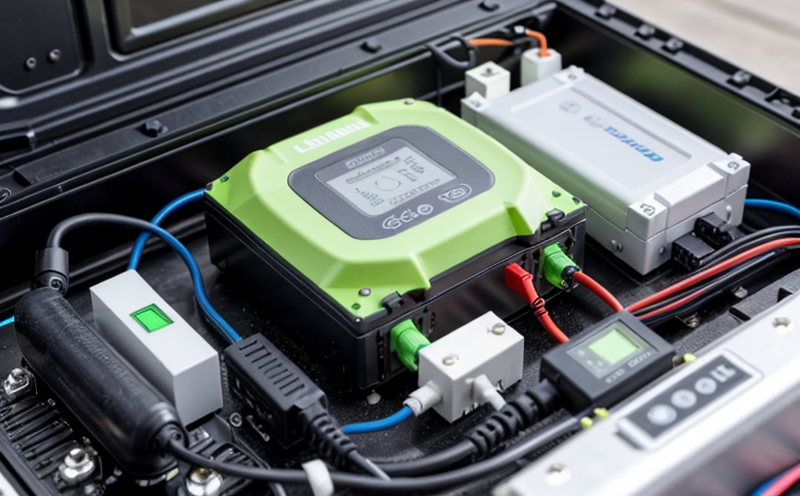GB/T 18287 Lithium-Ion Battery Testing for Mobile Phones
The GB/T 18287 standard is a critical technical guideline that ensures the safety and reliability of lithium-ion batteries used in mobile phones. This comprehensive testing protocol covers a range of essential parameters to ensure the safe operation, durability, and performance of these batteries.
The primary goal of this testing process is to identify potential hazards associated with lithium-ion batteries, thereby protecting users from risks such as overheating, short circuits, and explosions. The standard focuses on various aspects including mechanical integrity tests, electrical safety assessments, thermal stability evaluations, and more. Mechanical integrity tests assess the battery's resistance to physical damage, while electrical safety checks ensure that there are no hazardous levels of current or voltage.
Thermal stability evaluations monitor how well a lithium-ion battery withstands extreme temperatures without degrading performance or posing risks. Additionally, this standard also includes specific requirements for charging and discharging cycles which simulate real-world usage conditions. By adhering to these stringent protocols, manufacturers can produce safer products that meet international safety standards.
Compliance with GB/T 18287 is mandatory for any manufacturer wishing to sell their mobile phones within China or other countries adopting this standard. Failure to comply may result in product recalls and reputational damage. It’s important for companies to understand not only what the standard entails but also how it impacts various stages of production from design through manufacturing.
The testing procedures outlined in GB/T 18287 are designed to be rigorous yet practical, ensuring both consumer safety and operational efficiency. Understanding these requirements is crucial for quality managers, compliance officers, R&D engineers, and procurement teams involved in mobile phone development and manufacturing processes.
Scope and Methodology
The scope of GB/T 18287 Lithium-Ion Battery Testing for Mobile Phones encompasses several key areas including structural integrity, electrical safety, thermal stability, and operational performance. Structural integrity tests evaluate the durability of the battery under various stress conditions such as drop impact or vibration. Electrical safety assessments focus on preventing overcharging, short circuits, and other issues that could lead to fires or explosions.
Thermal stability evaluations are conducted using controlled environments where temperature extremes are applied to observe the behavior of the battery. Operational performance tests mimic actual use scenarios like charging cycles and discharge rates to ensure consistent output throughout the lifecycle of the product. Compliance with these tests provides assurance regarding the overall safety profile of the lithium-ion batteries used in mobile phones.
The methodology employed during testing involves precise measurement techniques and advanced diagnostic tools capable of detecting even minor deviations from acceptable limits. These methods are designed to provide accurate results that reflect real-world performance while maintaining consistency across multiple samples.
Industry Applications
- Mobile Phone Manufacturers: Ensuring the safety and reliability of lithium-ion batteries is paramount for mobile phone manufacturers. GB/T 18287 provides a framework to meet regulatory requirements and build trust with consumers.
- R&D Engineers: R&D teams rely heavily on this standard during development stages to identify potential weaknesses early in the design process.
- Quality Managers: They play an integral role in implementing rigorous quality control measures based on GB/T 18287 guidelines throughout production lines.
- Compliance Officers: Keeping abreast of changing regulations and ensuring compliance with standards like GB/T 18287 is essential for regulatory adherence.
The comprehensive nature of GB/T 18287 Lithium-Ion Battery Testing ensures that all stakeholders involved in mobile phone manufacturing have access to reliable testing methodologies. This contributes significantly towards enhancing the safety and reliability of lithium-ion batteries used in modern smartphones.
Customer Impact and Satisfaction
Adherence to GB/T 18287 Lithium-Ion Battery Testing not only enhances the safety profile but also significantly improves customer satisfaction. Consumers are increasingly concerned about product safety, especially when it comes to electronic devices like mobile phones which they carry close to their bodies.
Batteries that pass rigorous testing according to GB/T 18287 instill confidence among users knowing they are protected from hazards such as overheating or short circuits. This leads to higher customer satisfaction ratings and stronger brand loyalty. Moreover, meeting these standards helps manufacturers avoid costly product recalls due to safety concerns.
For businesses operating in competitive markets, compliance with GB/T 18287 can be a differentiating factor. It demonstrates commitment to quality and consumer protection which resonates well with environmentally conscious consumers seeking sustainable practices across industries.





